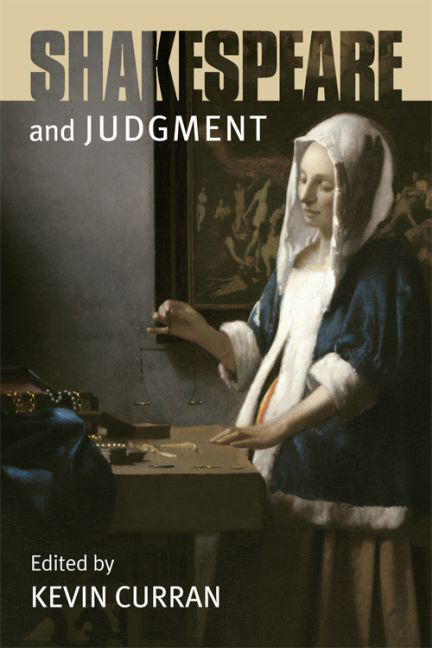Book contents
- Frontmatter
- Contents
- Acknowledgments
- List of Contributors
- Introduction
- Part I Staging Judgment: Deliberation in the Plays
- 1 Preventive Justice in Measure for Measure
- 2 Believing in Ghosts, in Part: Judgment and Indecision in Hamlet
- 3 Shakespeare's Law and Plowden's Authority
- Part II Audience Judgment: Deliberation in the Theater
- Part III The Ethics of Judgment
- Index
2 - Believing in Ghosts, in Part: Judgment and Indecision in Hamlet
from Part I - Staging Judgment: Deliberation in the Plays
Published online by Cambridge University Press: 10 May 2017
- Frontmatter
- Contents
- Acknowledgments
- List of Contributors
- Introduction
- Part I Staging Judgment: Deliberation in the Plays
- 1 Preventive Justice in Measure for Measure
- 2 Believing in Ghosts, in Part: Judgment and Indecision in Hamlet
- 3 Shakespeare's Law and Plowden's Authority
- Part II Audience Judgment: Deliberation in the Theater
- Part III The Ethics of Judgment
- Index
Summary
Within the contemporary humanities, and particularly in the many varieties of critical theory that have dominated its interpretive lexicon for some years now, the “critique of subjectivity” has acquired the status of doxa. There are many reasons for this critique, whether it be the putative indemonstrability of consciousness; the promethean overvaluation of the subject's capacities for agency; the converse fear of solipsism and impotence; the anthropocentrism thought to be implicit in the category of subjectivity; the suspicion of a liberal conception of autonomy that supposedly severs the subject from its social world; the assumption that consciousness is a mere epiphenomenon structured or even conditioned by material forces such as desire, affect, the body, history or the economy; the refusal of transcendence; and the denial of freedom. The list could no doubt be extended indefinitely. I am not suggesting that we jettison this critique entirely, nor do I mean to impugn all of the reasons behind it. Each one will need to be re-examined carefully, a task that cannot be undertaken here. But when the critique takes radical form, as it so often does, striving to eliminate from analysis any element of subjectivity or interiority, then we risk losing or rendering unintelligible some of the most basic concepts that make sense of the human and moral world, chief among them concepts such as agency, responsibility, and judgment. In particular, there can be no account of judgment that does not make reference both to subjectivity and to the milieu of ideality in which it operates.
If the category of subjectivity has come to seem so troubling, and Hamlet has at least since the late eighteenth century become one of the emblematic figures for subjectivity and interiority, it should not surprise us that critics such as Walter Benjamin and Margreta de Grazia have sought to rescue the play from the imputation that it is emblematic of the modern concerns with subjectivity, interiority, and the danger of inaction that invariably seems to accompany them. Yet despite these revisionist interpretations, it is difficult not to see Hamlet as someone who is obsessed with his own subjectivity and the metaphysical problem of subjectivity more generally.
- Type
- Chapter
- Information
- Shakespeare and Judgment , pp. 45 - 70Publisher: Edinburgh University PressPrint publication year: 2017

